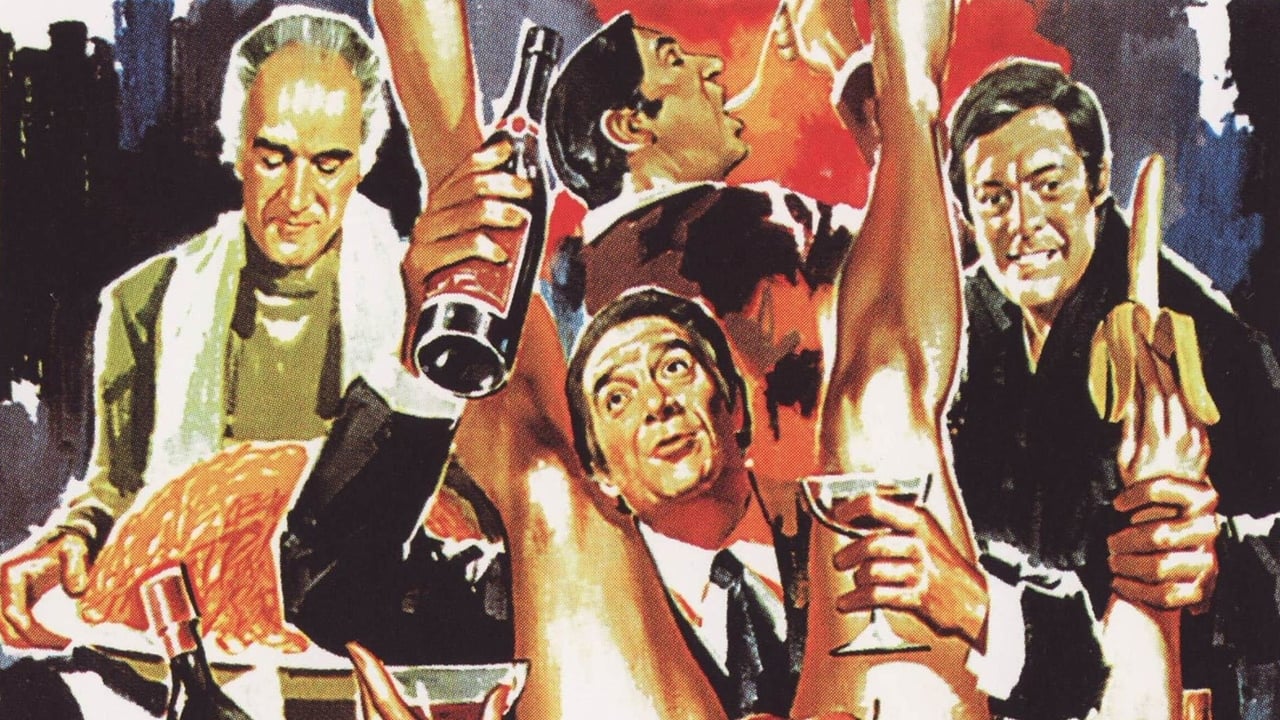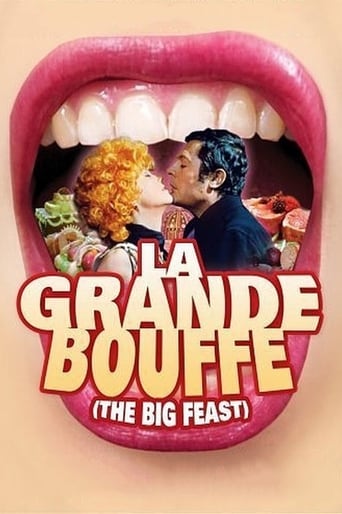

Let's be realistic.
... View MoreThere are moments that feel comical, some horrific, and some downright inspiring but the tonal shifts hardly matter as the end results come to a film that's perfect for this time.
... View MoreThis movie feels like it was made purely to piss off people who want good shows
... View MoreThis is a coming of age storyline that you've seen in one form or another for decades. It takes a truly unique voice to make yet another one worth watching.
... View MoreA group of men hire some prostitutes and go to a villa in the countryside. There, they engage in group sex and resolve to eat themselves to death.The film was somewhat controversial upon its original release with its scatological humor and comic depictions of sex and over-eating. This seems like something you might expect from Bunuel, mixed in a bit with "120 Days of Sodom" (or "Salo"). Not as gross, of course, but it seems to come from the same sort of feeling.I have no idea what was going on in France / Italy in the 1970s to make such strange films. I understand Bunuel's criticism of the bourgeoisie, as he had more or less always had a left-leaning streak of satire in him that came to the forefront later on. But here? If it is satire, it is much more obscure.
... View MoreSuperb black comedy of an ageing quartet gathered for a feast of epic proportions in which they indulge every gluttonous whim with culinary abandon. Their erotic gorging, groping and fondling of food and flesh is both appetising and arresting, as one by one, they stuff themselves to morbidity. It's with a tinge of sadness that their food fornication gradually comes to a halt, when the last man can no longer brook another chocolate pudding or roast pig.Those who appreciate gourmet cooking might find appeal in the vast menu, but will likely be shocked by the flatulence-passing, naked-backside food preparation techniques of these randy chefs. The cast periodically combine their appetite for food with unbridled sexual encounters while they prepare meals, to which the viewer is treated in full detail. But while the sets, costumes and dialogue are all, equally colourful, there's a distinct lack of momentum and coherent storyline in the near two-and-a-half hour epic. I submit, respectfully, there's only so many kitchen orgies one film can sustain (particularly as this isn't a loop) without a more concrete purpose.The cast are formidable in their distinct characterisations (and appetites), and it seems as though each has resigned to his own despair at a life unfulfilled. While Mastroianni does little cooking by comparison with Piccoli, he more than compensates with his sexual appetite at any number of the prostitutes assembled for their last supper. "Le Grande Bouffe" is a raw, uncompromising comedy like no other and should be seen to be believed.
... View MoreLa Grande Bouffe is, of course, a parody of how far one may go to end this life on Earth. The film was like a bomb in the industry at that time but today it has, perhaps, another meaning. The sexual relation that the teacher (Andrea) is over going in the film was in the 70 very provocative and still is. She, by the way, is the only one getting out alive in the film. All five actors are playing true people that don't compromise. They stand behind what they believe in. Nobody was asked to take the film seriously but everybody is taking it personalty : who wants to die of an overdose of food and sex ? Good question. Why not. Personnaly, I appreciated Andrea's free will and sexy style : of course I am a man : subsequently a macho : but, that is another discussion.
... View MoreThis film is supposed to be a criticism against consumerist society. Well,it could have been done much better.In fact,few people even in the Western world afford&allow themselves to indulge with such delicacies, the most expensive champagne. It is therefore a criticism of capitalism not as it really is,but as it is wrongfully depicted in some Communist propaganda about Western "decadence".Note that the events in the film must take place , in the year 1972 or 1973,because its characters know "The Godfather:Part one".This means the affluent society just before the Oil Crisis put an abrupt ending to the almost thirty years of relentless economical growth after 1945.So,realesed in 1973,the subject would have already been dated.It would have been much better if Ferreri would have made this film in the 80's,because it fits the materialistic credo of the following decade.The idea of the middle-aged man contemplating suicide was well used in films ranging from "The Waltz of the Toreadors" to "Scent of a Woman".Here the suicide pact between four quite wealthy middle-aged men is just unrealistic,especially if there is no logical reason,no plan,no actual pact.Only one character has diabetes and he dies in the most quick and painless manner by eating an entire cake and then passing away as if he fell asleep,as if he wanted desperately to convince the audience that he's dead,when not only the actor but even the character seem to "fake it"(death of course).But we know nothing more of his ailment and if this is the actual reason. Nor do we know why the other three are doing this.Mastroianni should have stuck to "La Dolce Vita",there his character experiences another kind of death and suicide,not physically,slowly defeated by a pleasure-seeking society.This part was the criticism of consumerism without graphic violence,vulgarity,physical signs of pain.But in this film,also being called Marcello,like in Fellini's masterpiece,his part is becoming a tasteless copy of his former part,another,more fleshy Marcello.The death scenes are more of an insult to intelligence rather than disturbing.The viewer is supposed to believe that the four deaths are plausible,if a doctor or even a person without medical knowledge can tell that neither of the characters could die in real life like they did here.They seem to know far too good when exactly they are going to die to be for real!Besides,in every thorough scientific analysis of the symptoms before and in the moment they died it is clear that the cause of their death is just a big deceit.Praised for its divinely decadent mood,this very mood is rather shabby. The villa which is supposed to be a gateway into the decadent verse,of luxury,of vintage class&style looks awfully tasteless and unimaginative,a sterile visual experience completed by a bunch of underfed,dirty poultry running around.And the Bugatti that just drives back and forth without advancing,in a surreal way of defying the laws of mechanics and the very mission of even the worst car,when it should be a fast vehicle.A hint at Isadora Duncan's death?Or just a symbol for the fact the pact once made,trough some incredulous,inexplicable and unrealistic laws of destiny no one will leave the house alive?The food which also serves as suicide weapon is understated and rather unappetizing,though expensive compared to the real French-Italian gourmet cuisine.The literary symbols are also out of place:this film should be a modern Satyricon,but it lacks the picturesque style of the Roman masterpiece,the "Godfather"-imitation is too anecdotal and superficial and Boileau's oak and its story are completely redundant in the plot line,because the hint that Boileau's world of classical harmony is dead in our postmodern times is a too obvious truism.The spectacular factor of Satyricon-style banquets is also lacking.The film should be a warning against the "mortal sin" of gluttony. Actually it is both pathetic and deprived of any realistic expression or emotion,because a real-life French or Italian gourmet would relish all these foods and many more without dying,without even getting sick.Ironically,only hours after I saw the film I also embarked on a weekend of lavish eating and drinking in a secluded mountain villa with my friends and,almost needless to say,after having consumed similar quantities none of us dies or even got sick,lol!-of course there was no suicide pact in our case.No exceeding excess(though made in the materialistic eighties,years of overspending,the same film would have had another message and such quantities of food would not have been used for dying,rather as a status symbol or even a psychotherapy in favor of living).It fails to condemn materialism because neither its temptations are shown as appealing or sinful(and even less as deadly)nor is death due to them the slightest bit possible in real life,and also failing to bear any lessons against excessive greed.One ends up pitying not the basic needs and vices of the characters,nor their low morality,rather their immense tastelessness(even in death)and their unimaginative behavior exhaling mediocrity,essentially non-intellectual though their are supposed to be educated.The parallel between food and the forces of life and death,of eroticism and passion is key element in films ranging from the tragic "Como l'Agua para chocolate"(where food and recipes are present in the most disturbing and intense moments of the character's doom)up to that forgettable pseudo-entertainment called "Woman on top".In this film it was just misplaced and misused.Much more convincing films about how consumerism and the promise of material happiness in a shallow,ruthless society have a crippling impact on the individual,but not necessarily trough food and suicide pacts,like "Blow-up","La Dolce vita","Clockwork Orange","Scarface",Citizen Kane","Wall Street" or "American Beauty"-in all this masterpieces the characters are undergoing their own suicide without knowing,being dragged in the downward spiral of greed much more complex than for food,they may or may not be wiped out physically,but always(and in the long run much more painful)innerly.This film,on the other hand,where even the four deaths fail to be credible,is a shame,but fortunately an exception in the usually so artistically accomplished,so flawless European cinema.
... View More